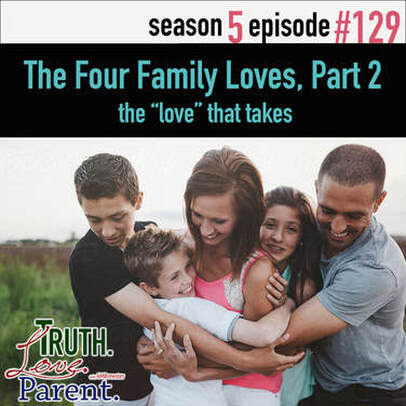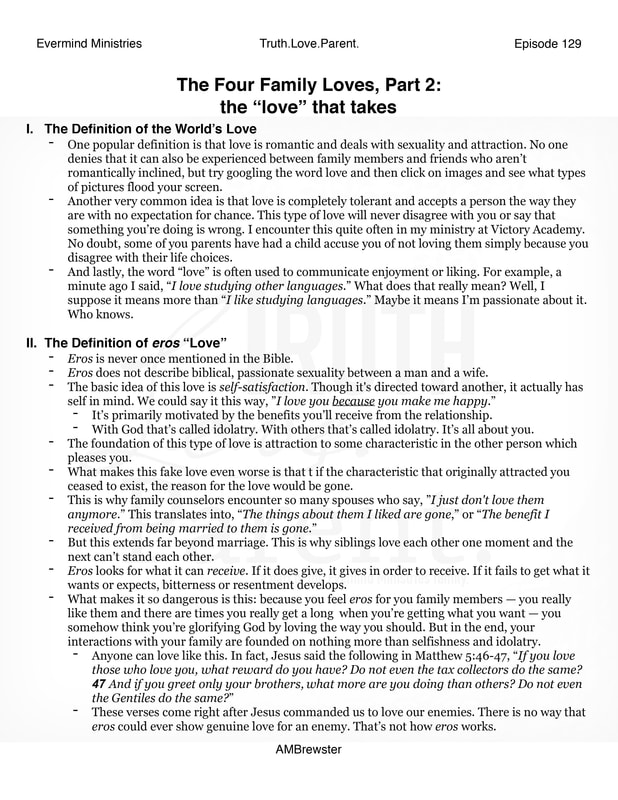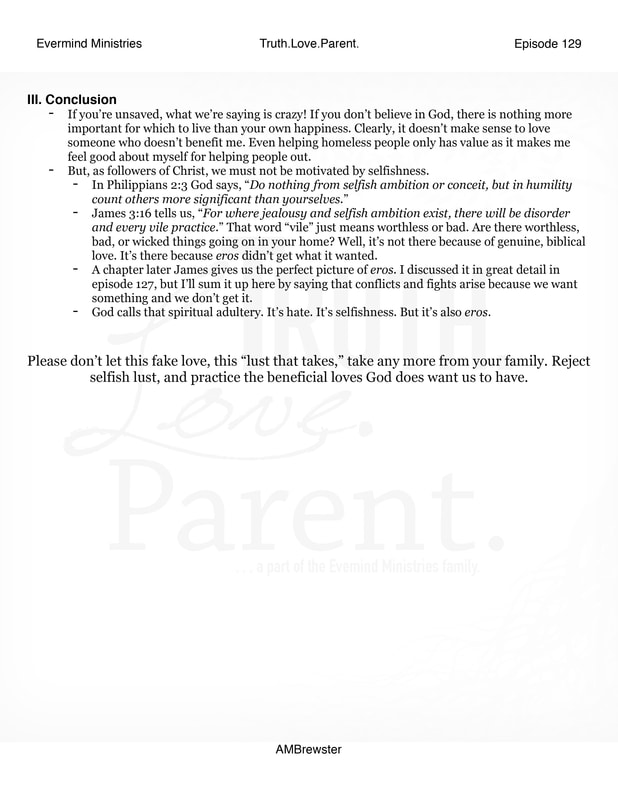 Does our culture truly understand love? Is their definition to be trusted? Today AMBrewster discusses a fake family love and helps Christian families stop selfishly tearing apart their relationships. Check out 5 Ways to Support TLP. Like us on Facebook. Follow us on Twitter. Follow AMBrewster on Twitter. Follow us on Pinterest. Subscribe on YouTube. Need some help? Write to us at [email protected]. Click "Read More" for today’s Episode Notes and Transcript. Episode NotesTo download this document, please right-click and select "Save Image As." TranscriptIntroductionWelcome back to the highest rated iTunes podcast for Christian parents. I pray today’s discussion flips your family upside down, and I hope you have your family with you today. Are you guys ready to learn about the first Family Love? I hope so. And if this is the first time you’re joining us, I’d like to welcome you and invite you to listen to all of our podcasts from the beginning. Our content is evergreen because God’s Word is eternally relevant. But I defiantly encourage you to stop right here and listen to the last episode, “The Four Family Loves, Part 1 | it’s something we have to do.” You need that foundation to be able to truly appreciate today’s study. Alright, let’s jump right in. TopicDid you know that in the Greek there are four words for love? Yes, I love studying other languages because you find that many of them do a much better job of communicating than English. Don’t get me wrong, I love my language, but some are far more precise, and Greek can often be that way. But even though there are four Greek words for love, only three of them show up in the New Testament. Of those three, two of them are mentioned and illustrated many times, but only one is repeatedly and aggressively commanded over and over again. So, if there are only three loves mentioned in the Bible, why did I call this study The Four Family Loves? That’s a great question. Well, like I said, even though only three of the Greek words for love show up in the New Testament, the Greeks did — in fact — have four words. And it’s that fourth word — the one that’s not in the Bible — that our world has come to accept as the general meaning of love. That’s why I referred to this love last time as a “Fake Love.” You’ll understand better as we tear this word apart. But first, let’s take a little bit of time to try to figure out what the world thinks when it uses the word “love.”
Well, if you Google “what is love”, the first site to pop up is theanatomyoflove.com. They offered this extended explanation, and I’m going to read it for you. I’m also going to change a few words assuming we have a younger audience listening in today. “Love is involuntary. Brain science tells us it's a drive like thirst. It's a craving for a specific person. It's normal, natural to ‘lose control’ in the early stage of romance. Love, like thirst, will make you do strange things, but knowledge is power. It's a natural addiction, and treating it like an addiction can help you. We were built to fall in love. “The ancient Greeks called love ‘the madness of the gods.’ Modern psychologists define it as it the strong desire for emotional union with another person. But what, actually, is love. It means so many different things to different people. Songwriters have described it, 'Whenever you’re near, I hear a symphony.’ Shakespeare said, ‘Love is blind and lovers cannot see.’ Aristotle said, ‘Love is composed of a single soul inhabiting two bodies.’ “But we think that romance is one of three basic brain systems that evolved for mating and reproduction: “The drive [to reproduce] or lust — the craving for gratification --evolved to enable you to seek a range of potential mating partners. After all, you can have relationships with someone you aren’t in love with. You can even feel the drive when you are driving in your car, reading a magazine or watching a movie. Lust is not necessarily focused on a particular individual. “Romantic love, or attraction— the obsessive thinking about and craving for a particular person — evolved to enable you to focus your mating energy on just one individual at a time. As Kabir, the Indian poet put it: ‘The lane of love is narrow; there is room for only one.’ “Attachment — the feeling of deep union with a long-term partner — evolved to enable you to remain with a mate at least long enough to rear a single child through infancy together as a team —although many of us remain together much longer, and enjoy the benefits of life with a partner even when there is no goal to have children. “These three brain systems — and feelings — interact in many ways to create our myriad forms of loving.” Unquote. Wow. That was painful. I don’t say that to be unkind; I say that because sin hurts. That definition of love is nowhere to be found in Scripture. In fact, it contradicts nearly everything the Bible reveals about love. And — as you may have guessed — it aligns perfectly with The Fake Family Love we’re discussing today. Alright, the Greek word in question is eros. You don’t have to be a Greek scholar to realize that this word is the root of the English word “erotic.” And that’s exactly what kind of love this is. Eros is a love of passion, an over mastering passion that seizes and absorbs itself into the mind. It’s a love that is an emotional involvement based on body chemistry. Now, many people may say, “Well, that’s not so bad as long as we’re talking about eros within a Christ-honoring marriage.” Unfortunately, that’s not accurate. First, keep in mind that eros is never once mentioned in the Bible. Many people try to point to passages about passionate love between husband and wife to be an example of eros, but it’s not, and here’s why. The basic idea of this love is self-satisfaction. Though it's directed toward another, it actually has self in mind. We could say it this way, ”I love you because you make me happy.” Often times when trying to explain the ways people try to take advantage of God, I’ll use this illustration with my boys. “Let’s say there are four girls who are interested in being your girlfriend. The first is extremely clingy and can’t stand not having a boyfriend. But she wants to get away from the one she has, so she’d trying to go out with you to get away from the other guy. The second girl just wants to be your girlfriend because of your money. The third girl doesn’t really want to be your girlfriend, but her parents told her she should. And the fourth girl wants to be your girlfriend for no other reason than she really like you. It’s not because she will get anything out of it.” Well, you can imagine which girl the boys choose. You would make the same choice. And then I warn the guys that asking Jesus to save you simply to escape Hell, or merely so you can gain some perceived benefit from being His child, or just because your parents told you it’s a good idea . . . is eros. It’s primarily motivated by the benefits you’ll receive from the relationship. With God that’s called idolatry. With others that’s called idolatry. It’s all about you. The foundation of this type of love is some characteristic in the other person which pleases you. Now, I know I’m describing the exact type of love that many parents encourage their children to look for. We tell our kids to find a boyfriend or girlfriend who will make you happy. But that concept is nowhere in Scripture. In fact, what makes this fake love even worse is that the foundation of eros is that if the characteristic that originally attracted you would cease to exist, the reason for the love would be gone. This is why — as a family counselor — I encounter so many spouses who say, ”I just don't love them anymore.” This translates into, “The things about them I liked are gone,” or “The benefit I received from being married to them is gone.” But this extends far beyond marriage. This is why siblings love each other one moment and the next can’t stand each other. Eros looks for what it can receive. If it does give, it gives in order to receive. If it fails to get what it wants or expects, bitterness or resentment develops. Now, I understand the difficulty of swallowing what I’m placing before you. So far I haven’t offered a better definition of love. I haven’t yet in the past episode or in this one even suggested what Biblical love looks like, and yet I’m asking you to reject the commonly accepted definition of love in our culture. And this is why: everything we do goes back to philosophy. Philosophy is why you do what you do. We talked about this in great detail in our Merest Christianity series when we looked at why your children do what they do. The first part of the series is episode 95. If you haven’t heard it, I strongly encourage you to check it out. The Failure Philosophy behind eros is that loving depends on being attracted in some way to another person. It's a conditional type of love. And anyone — saved or unsaved — can feel this type of lust. Again, please know that God talks about biblical sexuality and the relationship between husbands and wives, and he never mentions eros. But he does command us to have other types of love. And outside of marriage, there is absolutely no room for eros in any relationship. Now, I do want to quickly clear the air with the adults without opening a can of worms for the kids. Do you like my mixed metaphors? Anyway, I am NOT saying that romance, attraction, and passion are not biblical. They are extremely biblical, necessary in a Christ-Honoring marriage, and holy when lived out to God’s honor and glory. What I am saying is that lust, selfishness, and using someone to get what you want is a sin. Parents, do you relate to your kids one way when they’re doing what you say and then struggle to love them when they’re terrorizing the household? Kids, do you love the people who make your life comfortable and hate the people who get in your way? Spouses, is your partner there to serve you, or are you there to serve them — and not because of what you may later get out of it, but simply because it pleases the Lord? Kids, do you still love your parents when they have to give you consequences? Second to not believing God’s Word, I think eros is the most devious and destructive influence in our homes. What makes it so dangerous is this: because I feel eros for my family members — you know, I really like them and there are times we really get a long — I somehow think I’m glorifying God by loving the way I should. But in the end, my interactions with my family are founded on nothing more than selfishness and idolatry. Anyone can love like this. In fact, Jesus said the following in Matthew 5:46-47, “If you love those who love you, what reward do you have? Do not even the tax collectors do the same? 47 And if you greet only your brothers, what more are you doing than others? Do not even the Gentiles do the same?” These verses come right after Jesus commanded us to love our enemies. There is no way that eros could ever show genuine love for an enemy. That’s not how it works. ConclusionNow, there is so much more that could be said about this, but I’m trying to keep this series positive. I don’t really want to dwell on all the wrong definitions and bad philosophies. I’d rather spend our whole time staring at the amazing grandeur that is biblical love.
Instead of studying counterfeits, I want to immerse myself in the authentic. But, I knew I couldn’t do this study justice until I addressed a number of misconceptions in our home. That’s why the two episodes on hate and this episode are so necessary. Calling eros a fake love is accurate, but it’s really too nice. Eros is hate. It’s using someone for the benefit I receive. Now, if you’re unsaved, what I’m saying is crazy! If you don’t believe in God, there is nothing more important for which to live than your own happiness. Clearly, it doesn’t make sense to love someone who doesn’t benefit me. Even helping homeless people only has value as it makes me feel good about myself for helping people out. But, as followers of Christ, we must not be motivated by selfishness. In Philippians 2:3 God says, “Do nothing from selfish ambition or conceit, but in humility count others more significant than yourselves.” James 3:16 tells us, “For where jealousy and selfish ambition exist, there will be disorder and every vile practice.” That word “vile” just means worthless or bad. Are there worthless, bad, or wicked things going on in your home? Well, it’s not there because of genuine, biblical love. It’s there because eros didn’t get what it wanted. A chapter later James gives us the perfect picture of eros. I discussed it in great detail in episode 127, but I’ll sum it up here by saying that conflicts and fights arise because we want something and we don’t get it. God calls that spiritual adultery. It’s hate. But it’s also eros. Please don’t let this fake love, this “lust that takes” take any more from your family. Reject selfish lust, and next time we can start studying the beneficial loves God does want us to have. And please share this episode with your friends. Eros is tearing families apart all over the world. Let’s join together to shine the light and help people see the kind of love that kills and the kind of love that heals. As always, I encourage you to check out the episode notes linked in the description. They’re not nearly as robust as the last set of notes, but it should help your family as you learn to truly love each other. As I mentioned, our next episode is about the love that should be natural. Is this love alive in your home, or has it faded? If it has faded, what can you do about it? I hope you’ll all join us next time. I’d “love” to thank Cara for being a Patron of Truth.Love.Parent. Because of her and the other patrons, we can continue providing free resources to families all over the world. Will you prayerfully consider joining Cara in support TLP? You can learn more by clicking the “5 Ways to Support TLP” link below. The world has no idea what love is, but God — the Creator of love — God — the One who is love Himself — has everything our families need to be a haven of true love. See you next time.
0 Comments
Leave a Reply. |
Receive UpdatesJoin The TLP Family and receive email updates when we publish new articles and episodes.
Subscribe to Our PodcastCategories
All
Archives
July 2024
|
Truth.Love.Family.
- Truth.Love.Family.
- Donate
-
Podcast
-
Special Guests
>
- Ryan & Kim Ahrens
- Scott & Becky Aniol
- George Barna
- Dave Bender
- Alan Benson
- Carolyn Brewster
- Tim Challies
- Natasha Crain
- Kristen Clark
- Hillary Morgan Ferrer
- Todd Friel
- Ken Ham
- Jay Holland
- Kristen Jenson
- Chris Kaspar
- Becky Keife
- Heath Lambert
- Jessica Mair
- Dr. Joe Martin
- Mark Massey
- Katie Miller
- Jim Newheiser
- Steve Pettit
- Shannon Popkin
- Aaron & Elaina Sharp
- Mark Shaw
- Lynna Sutherland
- Nathan & Anna Sutherland
- Brandon Talley
- Arthur C. Woods
- Episodes by Series
- Episodes by Topic
- Where to Listen
-
Special Guests
>
- Community
-
Resources
- Counseling
- Speaking
- The Celebration of God
- AMBrewster.com
- Evermind Store
|
To submit general questions or ideas for future episodes: [email protected]
To request specific assistance for your family: [email protected] |
We are a participant in the Amazon Services LLC Associates Program. As an Amazon Associate, we earn from qualifying purchases. Click any Amazon link at TruthLoveParent.com, shop as usual, and TLP will receive commissions off all of your sales! Click here to learn more.
Site powered by Weebly.








 RSS Feed
RSS Feed
